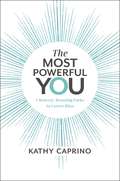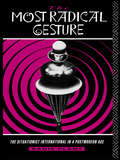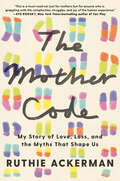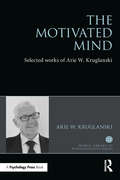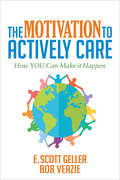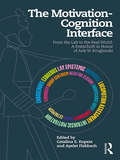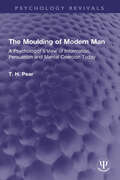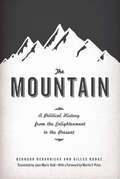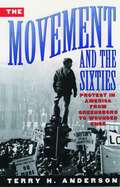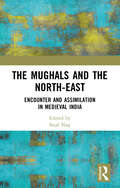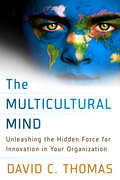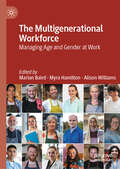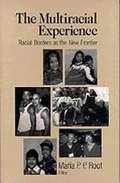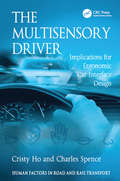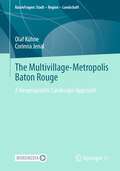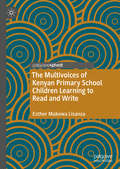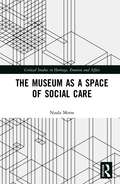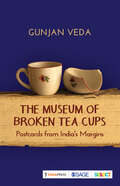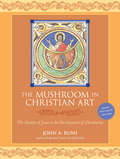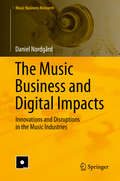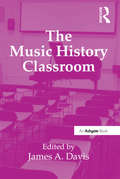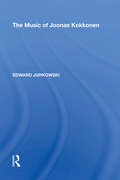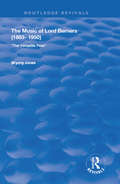- Table View
- List View
The Most Powerful You: 7 Bravery-Boosting Paths to Career Bliss
by Kathy CaprinoKathy Caprino guides women to take the reins in their careers by identifying and overcoming the seven most damaging power gaps holding them back from the success they want and deserve.The business world has been forever changed by the important progress and contributions that women have made. Yet, with only 38% of manager roles and 22% of C-suite positions being held by women, women continue to struggle to achieve the reward, respect, and authority they have earned.In these pages, career, executive and leadership coach Kathy Caprino helps women conquer the seven destructive power gaps within the workforce, outline the key steps you can take to access greater positive power, and become the true author of your life.Through riveting real-life success stories of women overcoming these gaps, and proven strategies and solutions from more than 30 of the nation&’s top experts in fields that are essential to women&’s success, the exercises in The Most Powerful You will equip you with the strength to:See yourself more powerfully (Brave Sight)Speak more confidently (Brave Speak)Ask for and receive what you deserve (Brave Ask)Connect to your advantage with influential support (Brave Connection)Challenge and change negative behavior toward you (Brave Challenge)Be of service in more meaningful ways (Brave Service)Heal from past trauma and challenge (Brave Healing) Most importantly, The Most Powerful You will reconnect you to the thrilling dreams you once had for your life and empower you to take the necessary steps to reclaim that dream while making your positive impact in the world.
The Most Radical Gesture: The Situationist International in a Postmodern Age
by Sadie PlantThis book is the first major study of the Situationist International. Tracing the history, ideas and influences of this radical and inspiring movement from dada to postmodernism, it argues that situationist ideas of art, revolution, everyday life and the spectacle continue to inform a variety of the most urgent poltical events, cultural movements, and theoretical debates of our times.
The Mother Code: My Story of Love, Loss, and the Myths That Shape Us
by Ruthie AckermanIn this propulsive memoir, an award-winning journalist blends history, science, and cultural criticism to uncover whether motherhood outside of society&’s rigid rules and expectations is possible—and whether she fits the mold for what a mother should be.&“This tender, generous book does the hard work of redefining &‘motherhood&’ and &‘family&’ so that they honor all aspects of a woman&’s life.&”—Christie Tate, author of the New York Times bestseller GroupRuthie Ackerman had long believed that the decision to not have children was a radical act. She&’d grown up being told that she came from a long line of women who had abandoned their kids and feared she would pass on her half-brother&’s rare genetic disorder. So when she marries a man who doesn&’t want children, she hopes she can be happy without any. But a voice in her head keeps returning to the question: What if mothering can be a radical act too? When her marriage veers off course, she goes searching through the twists and turns of her DNA to decide once and for all whether she should become a mother.By the time Ruthie finally determines that she desperately wants a child, she learns that motherhood won&’t happen the way she thought it would. Now she must enter the hall of mirrors where biology, genetics, and philosophy collide as she wonders what it means to both create and nurture a life. What does inheritance really entail? What does it mean to be a &“good&” mother? When it comes down to it, how important is nature versus nurture? And where are the models for what a &“good life&” can look like for women, both with and without children?Synthesizing reportage and memoir, The Mother Code unravels how we&’ve come to understand the institution of motherhood. What emerges is a groundbreaking new vision for what it means to parent: a mother code that goes beyond our bloodlines and genetics and instead urges us to embrace inheritance as the legacy we want to leave behind for those we love.
The Motivated Mind: The Selected Works of Arie Kruglanski (World Library of Psychologists)
by Arie Professor KruglanskiIn the World Library of Psychologists series, international experts themselves present career-long collections of what they judge to be their finest pieces - extracts from books, key articles, salient research findings, and their major practical theoretical contributions. In this volume Arie Kruglanski reflects on the development throughout his distinguished career of his wide-ranging research covering radicalisation, human judgement and belief formation, group and intergroup processes, and motivated cognition. This collection offers an invaluable insight into the key works behind the formation of Kruglanski’s seminal theory of lay epistemics, as well as his important input into a diverse range of fields of social psychology. A specially written introduction gives an intimate overview of this career, and contextualises the selection in relation to changes in the field during this time. With continuing relevance today, and of vast historical importance, this collection is essential reading for anyone with an interest in goals, belief formation, group processes, and social psychology in general.
The Motivation to Actively Care: How You Can Make it Happen
by E. Scott Geller Bob VeazieThis refreshing teaching/learning narrative, based on actual life events and research-supported principles, begins with the lead character (Joanne Cruse) losing her job as the Safety Director for a large manufacturing company. Subsequently, her former psychology professor, Dr. Pitz ("Doc"), invites her to try out for a position as leadership consultant with his firm, Make-A-Difference, Inc. (MAD) that helps companies cultivate a self-motivated and personally-engaged workforce. Throughout her probationary period, Joanne travels with the top consultant at MAD (Mickey Vasquez) to visit a number of organizations struggling with various occupational issues related to the human dynamics of self-motivation (i.e., working to accomplish an organization's milestone from a self-directed or self-accountability mindset). The interpersonal and group interactions Joanne experiences at diverse organizations, accompanied by Mickey’s professional coaching, reveal twenty practical and profound leadership lessons to nurture an actively caring for people work culture in which employees put forth their best efforts on behalf of their company's mission.
The Motivation-Cognition Interface: From the Lab to the Real World: A Festschrift in Honor of Arie W. Kruglanski
by Catalina E. Kopetz Ayelet FishbachThis volume honors the work of Arie W. Kruglanski. It represents a collection of chapters written by Arie’s former students, friends, and collaborators. The chapters are rather diverse and cover a variety of topics from politics, including international terrorism, to health related issues, such as addiction and self-control, to basic psychological principles, such as motivation and self-regulation, the formation of attitudes, social influence, and interpersonal relationships. What these chapters have in common is that they have all been inspired by Arie’s revolutionary work on human motivation and represent the authors’ attempt to apply the basic principles of motivation to the understanding of diverse phenomena.
The Moulding of Modern Man: A Psychologist's View of Information, Persuasion and Mental Coercion Today (Psychology Revivals)
by T. H. PearFirst published in 1961, The Moulding of Modern Man discusses views of the nature and boundaries of the Self, its relation to the physical world and to human beings, real and imagined, with reference to procedures training ‘space men’ to travel alone or in company, deprived of the assurances of sight, sound, even weight. It discusses methods of publicity and advertising, of overtly or covertly influencing motives, subception or subliminal persuasion and techniques of ‘thought reform’ often vaguely termed character training, and, more confusingly, ‘brain-washing’. Other topical subjects are conflicting loyalties, with special reference to the moral problems of scientists; the social significance in different countries of intellectuals and anti-intellectuals; the effects of mass culture upon the individual’s beliefs, tastes and opinions; the role of the Organization Man in Britain; the concepts of ‘face’ and ‘prestige’ in groups and nations; and conflicting ideas of progress maintained by contemporary thinkers in ‘two cultures’. This book will be of interest to students of philosophy and psychology.
The Mountain: A Political History from the Enlightenment to the Present
by Bernard Debarbieux Gilles RudazIn The Mountain, geographers Bernard Debarbieux and Gilles Rudaz trace the origins of the very concept of a mountain, showing how it is not a mere geographic feature but ultimately an idea, one that has evolved over time, influenced by changes in political climates and cultural attitudes. To truly understand mountains, they argue, we must view them not only as material realities but as social constructs, ones that can mean radically different things to different people in different settings. From the Enlightenment to the present day, and using a variety of case studies from all the continents, the authors show us how our ideas of and about mountains have changed with the times and how a wide range of policies, from border delineation to forestry as well as nature protection and social programs, have been shaped according to them. A rich hybrid analysis of geography, history, culture, and politics, the book promises to forever change the way we look at mountains.
The Movement and the Sixties
by Terry AndersonA searching history of the social activism that defined a generation of young Americans and that called into question the very nature of "America."
The Mughals and the North-East: Encounter and Assimilation in Medieval India
by Sajal NagThere is a perception that the region of north-east India maintained its ‘splendid isolation’ and remained outside the reach of the Mughals and did not have a pre-colonial past. The present book is an attempt to decenter and demolish the said perceptions and asserts that north-east India had a ‘medieval’ past through linkage with the dominant central power in India – the Mughals. The eastern frontier of this Mughal Empire was constituted by a number of states like Bengal, Koch Bihar, Assam, Manipur, Dimasa, Jaintia, Cachar, Tripura, Khasi confederation, Chittagong, Lushai and the Nagas. Of these, some areas like Bengal were an integral part of the Mughal Empire, while others like Koch Bihar and Assam were in and out of the empire. Tripura, Manipur, Jaintia and Cachar were frequently overrun by the Mughals whenever the State was short of revenue and withdrew soon without incorporating them in the state. Despite not being a formal part of the Mughal Empire, the society, economy, polity and culture of the north-east India, however, had been majorly impacted by the Mughal presence. The brief, but effective advent of the Mughals had supplanted certain political and revenue institutions in various states. It generated trade and commerce, which linked it to the rest of India. A number of wondering Sufi saints, Islamic missionaries, imprisoned Mughal soldiers and officers were settled in various states, which resulted in a substantial Muslim population growth in the region. Besides the population, there are numerous Islamic and syncretic institutions, cultures, and shrines which dot the entire region.
The Multicultural Mind: Unleashing the Hidden Force for Innovation in Your Organization
by David ThomasGlobalization has created a superheated competitive business environment that demands innovation to stay ahead. But it's also created a hidden source of innovation right in your midst: the people in your organization who have deep experience in more than one culture—multiculturals. Having to integrate different cultural frameworks has enabled them to develop abilities that can contribute powerfully to building innovative organizations. David Thomas makes a compelling business case for recognizing and cultivating a new dimension of diversity—the diversity within individuals! He looks at how to establish the organizational conditions under which multiculturals can flourish and shows how even the most monocultural among us can gain the advantages of a multicultural mind.
The Multigenerational Workforce: Managing Age and Gender at Work
by Myra Hamilton Alison Williams Marian BairdThis book provides original and groundbreaking insights into the development and outcomes of multigenerational workforce strategies in Australian workplaces through the combined lens of age, gender and caring. Based on a large-scale study and real-world case studies with six Australian organisations, it highlights leading policies and practices that promote successful ageing at work, identifies optimal work designs for older workers’ participation, engagement and wellbeing at work, and offers strategies to support workers to combine work and unpaid care at different times in their lives. The book offers essential guidance for those undertaking research on multigenerational workforces, and for managers, human resource staff, diversity and inclusion staff, and other practitioners in organisations seeking to deepen their understanding of age- and gender-inclusive workforce policies and practices in the context of ageing populations and workforces.
The Multiracial Experience: Racial Borders as the New Frontier
by Maria P. P. RootFor the first time in US history, according to the Census Bureau, the number of biracial babies is increasing at a faster rate than the number of single-race babies. In this collection educators, philosophers, sociologists, social workers, and others consider personal experience and theory as well as practical ideas for incorporating mutltiracial thinking into areas such as education, gender issues, and census forms. The 24 essays are divided into six sections: human rights; identity; blending and flexibility; gender and sexual identity; multicultural education; and the new millennium.
The Multisensory Driver: Implications for Ergonomic Car Interface Design (Human Factors in Road and Rail Transport)
by Charles Spence Cristy HoDriver inattention has been identified as one of the leading causes for car accidents. The problem of distraction while driving is likely to worsen, partly due to increasingly complex in-car technologies. However, intelligent transport systems are being developed to assist drivers and to ensure a safe road environment. One approach to the design of ergonomic automobile systems is to integrate our understanding of the human information processing systems into the design process. This book aims to further the design of ergonomic multisensory interfaces using research from the fast-growing field of cognitive neuroscience. It focuses on two aspects of driver information-processing in particular: multisensory interactions and the spatial distribution of attention in driving. The Multisensory Driver provides interface design guidelines together with a detailed review of current cognitive neuroscience and behavioural research in multisensory human perception, which will help the development of ergonomic interfaces. The discussion on spatial attention is particularly relevant for car interface designers, but it will also appeal to cognitive psychologists interested in spatial attention and the applications of these theoretical research findings. Giving a detailed description of a cohesive series of psychophysical experiments on multisensory warning signals, conducted in both laboratory and simulator settings, this book provides an approach for those in the engineering discipline who wish to test their systems with human observers.
The Multivillage-Metropolis Baton Rouge: A Neopragmatic Landscape Approach (RaumFragen: Stadt – Region – Landschaft)
by Olaf Kühne Corinna JenalThe capital of Louisiana, Baton Rouge, has been the scene of fundamental changes in recent decades. In the context of the tripole of petrochemistry, Louisiana State University (LSU) and public administration (especially of the state of Louisiana), which has been fully developed since the end of the 1920s, general processes (such as the transition from modern to post-modern spatial development) mix with specific local and regional characteristics and logics, also in dealing with spaces (such as the eccentric location of the downtown area, the limited influence of spatial planning). The result is a social-spatial formation of a 'multivillage metropolis'. The investigation of this 'multivillage metropolis' follows a neopragmatic approach that triangulates different theories, methods, data and researcher perspectives.Videos per App: Laden Sie die Springer Nature More Media kostenlos herunter - Abbildungen im Buch per App mit Handy oder Tablet scannen, um Videos zu streamen.
The Multivoices of Kenyan Primary School Children Learning to Read and Write
by Esther Mukewa LisanzaThis book provides a rich and nuanced examination of children learning to read and write a second language in primary schools in Kenya, taught by teachers who themselves have often learned English as a second or third language. The author uses two case studies, of an urban and a rural school, to explore how different socioeconomic and cultural contexts can affect the enactment of language policies and their effect on literacy. This book contributes a unique perspective to studies in language and literacy education due to its distinctive exploration of young children learning to read and write in the English language in Kenya, and it will be of particular interest to students and scholars of applied linguistics, language education, bilingualism and language policy.
The Mural at the Waverly Inn: A Portrait of Greenwich Village Bohemians
by Dorothy Gallagher Edward SorelSorel--whose caricatures and drawings regularly appear in The New Yorker and on its cover--chose forty Greenwich Village greats from the past 150 years to cavort in bacchanalian splendor. Each of the 40 makes a solo appearance in these pages alongside a charming, telling vignette of his or her life by Dorothy Gallagher, then appears in a foldout of the entire mural at the back of the book.
The Murder of Christ
by Wilhelm ReichIn this profound and moving work, the scientist Wilhelm Reich explores the meaning of Christ's life and reveals the hidden, universal scourge that caused his agonizing death--The Emotional Plague of Mankind. Reich contends that man is faced with full responsibility for the murder of Christ all through the ages--for the murder of fellow human beings, no matter what the circumstances. Here is the blunt truth about people's true ways of being, acting and emotional reacting. Here, also, the lesson of the murder of Christ is applied to the contemporary social scene. The tragedy of Reich's own death points up the fact that the problems presented in THE MURDER OF CHRIST are acute problems of present-day society.-Print ed.
The Museum as a Space of Social Care (Critical Studies in Heritage, Emotion and Affect)
by Nuala MorseThis book examines the practice of community engagement in museums through the notion of care. It focuses on building an understanding of the logic of care that underpins this practice, with a view to outlining new roles for museums within community health and social care. This book engages with the recent growing focus on community participation in museum activities, notably in the area of health and wellbeing. It explores this theme through an analysis of the practices of community engagement workers at Tyne & Wear Archives & Museums in the UK. It examines how this work is operationalised and valued in the museum, and the institutional barriers to this practice. It presents the practices of care that shape community-led exhibitions, and community engagement projects involving health and social care partners and their clients. Drawing on the ethics of care and geographies of care literatures, this text provides readers with novel perspectives for transforming the museum into a space of social care. This book will appeal to museum studies scholars and professionals, geographers, organisational studies scholars, as well as students interested in the social role of museums.
The Museum of Broken Tea Cups: Postcards from India’s Margins
by Gunjan VedaThe performing arts in India have traditionally been the domain of Dalit communities. To this day, these men and women continue to nurture and foster their chosen art forms in the face of discrimination and prejudice. We consider ourselves to be connoisseurs of art and culture. Yet, we fail to recognize the very communities who have shaped this culture. The Museum of Broken Tea Cups, using the symbology of the used, broken tea cup that upper caste households leave outside their doors for the use of Dalit workers, is an effort to recognize the immense cultural contribution made by Dalit communities through the stories of individual artists who languish in the forgotten gallis and mohallas of our villages and towns. At the same time, the book seeks to celebrate the everyday heroes, who have, despite all odds, managed to change not just their own lives, but the lives of those around them. These are students and teachers, artists and activists, storytellers and devadasis, daughters and mothers, sons and brothers—seemingly ordinary people—whose faces get lost in everyday life, but whose stories have the potential to inspire admiration, action and change.
The Mushroom in Christian Art: The Identity of Jesus in the Development of Christianity
by John Rush Martin W. BallIn The Mushroom in Christian Art, author John A. Rush uses an artistic motif to define the nature of Christian art, establish the identity of Jesus, and expose the motive for his murder. Covering Christian art from 200 CE (common era) to the present, the author reveals that Jesus, the Teacher of Righteousness mentioned in the Dead Sea Scrolls, is a personification of the Holy Mushroom, Amanita muscaria. The mushroom, Rush argues, symbolizes numerous mind-altering substances—psychoactive mushrooms, cannabis, henbane, and mandrake—used by the early, more experimentally minded Christian sects.Drawing on primary historical sources, Rush traces the history—and face—of Jesus as being constructed and codified only after 325 CE. The author relates Jesus’s life to a mushroom typology, discovering its presence, disguised, in early Christian art. In the process, he reveals the ritual nature of the original Christian cults, rites, and rituals, including mushroom use. The book authoritatively uncovers Jesus’s message of peace, love, and spiritual growth and proposes his murder as a conspiracy by powerful reactionary forces who would replace that message with the oppressive religious-political system that endures to this day. Rush’s use of the mushroom motif as a springboard for challenging mainstream views of Western religious history is both provocative and persuasive.The package includes an informative DVD with 252 striking color images depicting Christian art, with key motifs indicated by the author.
The Music Business and Digital Impacts: Innovations and Disruptions in the Music Industries (Music Business Research)
by Daniel NordgårdThis book provides rare insights into the difficult and complex dialogues between stakeholders within and outside the music industries in a time of transition. It builds on a series of recorded meetings in which key stakeholders discuss and assess options and considerations for the music industries’ transition to a digital era. These talks were closed to the public and operated under the Chatham House Rule, which means that they involved a very different type of discussion from those held in public settings, panels or conferences. As such, the book offers a much more nuanced understanding of the industries’ difficulties in adjusting to changing conditions, demonstrating the internal power-struggles and differences that make digital change so difficult. After presenting a theoretical framework for assessing digital change in the music industries, the author then provides his research findings, including quotes from the Kristiansand Roundtable Conference. Following from these findings, he develops three critical concepts that explain the nature as well as the problems of the music industries’ adaptation process. In conclusion, he challenges the general definition of crisis in the music industries and contradicts the widely held view that digitalization is a case of vertical integration.
The Music History Classroom
by James A. DavisThe Music History Classroom brings together essays written by recognized and experienced teachers to assist in the design, implementation, and revision of college-level music history courses. This includes the traditional music history survey for music majors, but the materials presented here are applicable to other music history courses for music majors and general education students alike, including period classes, composer or repertory courses, and special topics classes and seminars. The authors bring current thought on the scholarship of teaching and learning together with practical experience into the unique environment of the music history classroom. While many of the issues confronting teachers in other disciplines are pertinent to music history classes, this collection addresses the unique nature of musical materials and the challenges involved in negotiating between historical information, complex technical musical issues, and the aesthetics of performing and listening. This single volume provides a systematic outline of practical teaching advice on all facets of music history pedagogy, including course design, classroom technology, listening and writing assignments, and more. The Music History Classroom presents the 'nuts-and-bolts' of teaching music history suitable for graduate students, junior faculty, and seasoned teachers alike.
The Music of Joonas Kokkonen
by Edward JurkowskiJoonas Kokkonen (1921-1996) has been one of the most performed Finnish composers during the past 25 years both within Finland and abroad.The author's study of Joonas Kokkonen is the first full-scale account in English. Starting with a brief survey of Finnish music during the 20th century, the book then devotes a separate chapter to each of the major genres in which Kokkonen composed: symphonic, orchestral, vocal, chamber and keyboard. Illustrated with over a hundred music examples, The Music of Joonas Kokkonen seeks to overturn his reputation in some quarters as a conservative, even old fashioned, composer, and argues that Kokkonen created an interesting and refreshing approach to dodecaphonic composition and pitch organization. With a full chronological listing of works and bibliography, this book is the most important reference source to date on Kokkonen and his music." "Book Description: One of the most performed Finnish composers during the last 25 years, Joonas Kokkonen (1921-1996) was also instrumental in the development of the nation's system of music education. In this study,the author (music, U. of Lethbridge, Canada) examines Kokkonen's compositions in each of five major genres: symphonic, orchestral, vocal, chamber, and key
The Music of Lord Berners (1883-1950): The Versatile Peer
by Bryony JonesThis title was first published in 2003. Gerald Tyrwhitt-Wilson, the 14th Baron Berners, was a well-known figure in his day. Labelled by the national press as "the versatile peer", he was a composer, writer, painter and great socialite. His musical output was small, but highly successful in its day, with ballets staged in London, Monte Carlo and New York, an opera produced in Paris, and two film scores completed in the 1940s. These works, together with Berners' songs, his music for piano, and other instrumental pieces are given their first in-depth examination in this study. Bryony Jones shows how Berners' cosmopolitan musical style radically differed from that of many of his contemporaries who were concerned with creating a "national" music. Instead, Berners drew his inspiration from abroad, and comparisons are drawn with Les Six, and connections made with the work of Satie, Debussy and Ravel. Well-known for his elaborate practical jokes and sense of humour, Berners was an archetype of British eccentricity, and these aspects of his personality shaped much of his musical style. The book concludes with an attempt to explain why Berners' music was neglected following his death, and why there has been a recent resurgence of interest.
